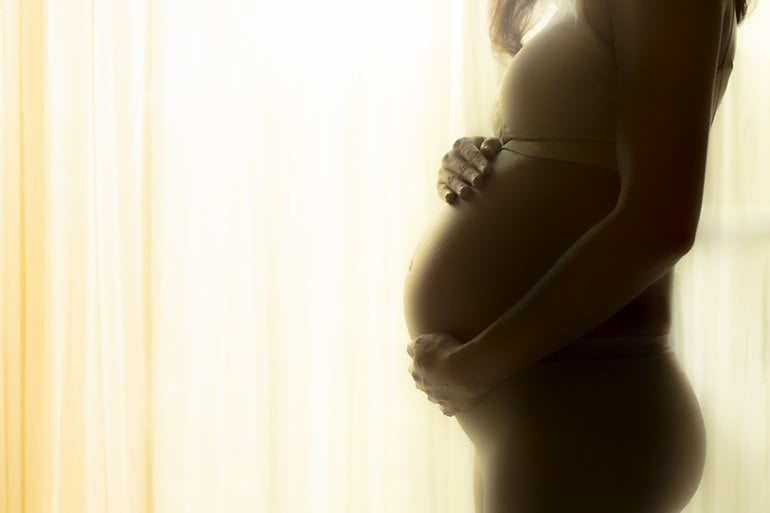Summary: Women who use cannabis during pregnancy are at increased risk of their child being diagnosed with autism.
Source: The Ottawa Hospital
In the largest study of its kind, Ottawa researchers found that children whose mothers reported using cannabis during pregnancy were at greater risk of autism. The incidence of autism was 4 per 1000 person-years among children exposed to cannabis in pregnancy, compared to 2.42 among unexposed children. The findings were published in the prestigious medical journal Nature Medicine.
Recreational cannabis is now legal in Canada, but that doesn’t mean it’s safe for people who are pregnant or breastfeeding. Health Canada and the Society of Obstetricians and Gynaecologists of Canada recommend against these populations using cannabis, and health warnings to this effect appear on cannabis packaging.
“Despite these warnings, there is evidence that more people are using cannabis during pregnancy,” said Dr. Mark Walker, Chief of the Department of Obstetrics, Gynecology and Newborn Care at The Ottawa Hospital, professor at the University of Ottawa and senior author on the study. “This is concerning, because we know so little about how cannabis affects pregnant women and their babies. Parents-to-be should inform themselves of the possible risks, and we hope studies like ours can help.”
The research team reviewed data from every birth in Ontario between 2007 and 2012, before recreational cannabis was legalized. Of the half a million women in the study, about 3,000 (0.6 percent) reported using cannabis during pregnancy.
The researchers had previously found that cannabis use in pregnancy was linked to an increased risk of preterm birth, and created an animated video to summarize their findings. In that study, they found that women who used cannabis during pregnancy often used other substances including tobacco, alcohol and opioids.
Considering those findings, in the current study the researchers specifically looked at 2,200 women who reported using only cannabis during pregnancy, and no other substances. They found that babies born to this group still had an increased risk of autism compared to those who did not use cannabis.
The researchers do not know how much cannabis the women were using, how often, at what time during their pregnancy, or how it was consumed. They also note that while they tried to control for other factors that could influence neurological development, their study can still only show association – not cause and effect.

As cannabis becomes more socially acceptable, health-care researchers are mindful that some parents-to-be might think it can be used to treat morning sickness.
“In the past, we haven’t had good data on the effect of cannabis on pregnancies,” said Dr. Daniel Corsi, Epidemiologist at The Ottawa Hospital and BORN Ontario, which is affiliated with the CHEO Research Institute. “This is one of the largest studies on this topic to date. We hope our findings will help women and their health-care providers make informed decisions.”
Women who are thinking about or currently using cannabis during pregnancy should talk to their health-care provider to help make an informed choice about what is best for them and their baby.
Funding: This study was funded by the Canadian Institutes of Health Research. Research at The Ottawa Hospital is possible thanks to generous donations to The Ottawa Hospital Foundation. BORN Ontario is supported by the Ontario Ministry of Health and Long Term Care.
About this autism research article
Source:
The Ottawa Hospital
Contacts:
Amelia Buchanan – The Ottawa Hospital
Image Source:
The image is in the public domain.
Original Research: Closed access
“Maternal cannabis use in pregnancy and child neurodevelopmental outcomes” by Daniel J. Corsi, Jessy Donelle, Ewa Sucha, Steven Hawken, Helen Hsu, Darine El-Chaâr, Lise Bisnaire, Deshayne Fell, Shi Wu Wen & Mark Walker. Nature Medicine.
Abstract
Maternal cannabis use in pregnancy and child neurodevelopmental outcomes
Cannabis use in pregnancy has increased1,2, and many women continue to use it throughout pregnancy3. With the legalization of recreational cannabis in many jurisdictions, there is concern about potentially adverse childhood outcomes related to prenatal exposure4. Using the provincial birth registry containing information on cannabis use during pregnancy, we perform a retrospective analysis of all live births in Ontario, Canada, between 1 April 2007 and 31 March 2012. We link pregnancy and birth data to provincial health administrative databases to ascertain child neurodevelopmental outcomes. We use matching techniques to control for confounding and Cox proportional hazards regression models to examine associations between prenatal cannabis use and child neurodevelopment. We find an association between maternal cannabis use in pregnancy and the incidence of autism spectrum disorder in the offspring. The incidence of autism spectrum disorder diagnosis was 4.00 per 1,000 person-years among children with exposure compared to 2.42 among unexposed children, and the fully adjusted hazard ratio was 1.51 (95% confidence interval: 1.17–1.96) in the matched cohort. The incidence of intellectual disability and learning disorders was higher among offspring of mothers who use cannabis in pregnancy, although less statistically robust. We emphasize a cautious interpretation of these findings given the likelihood of residual confounding.







